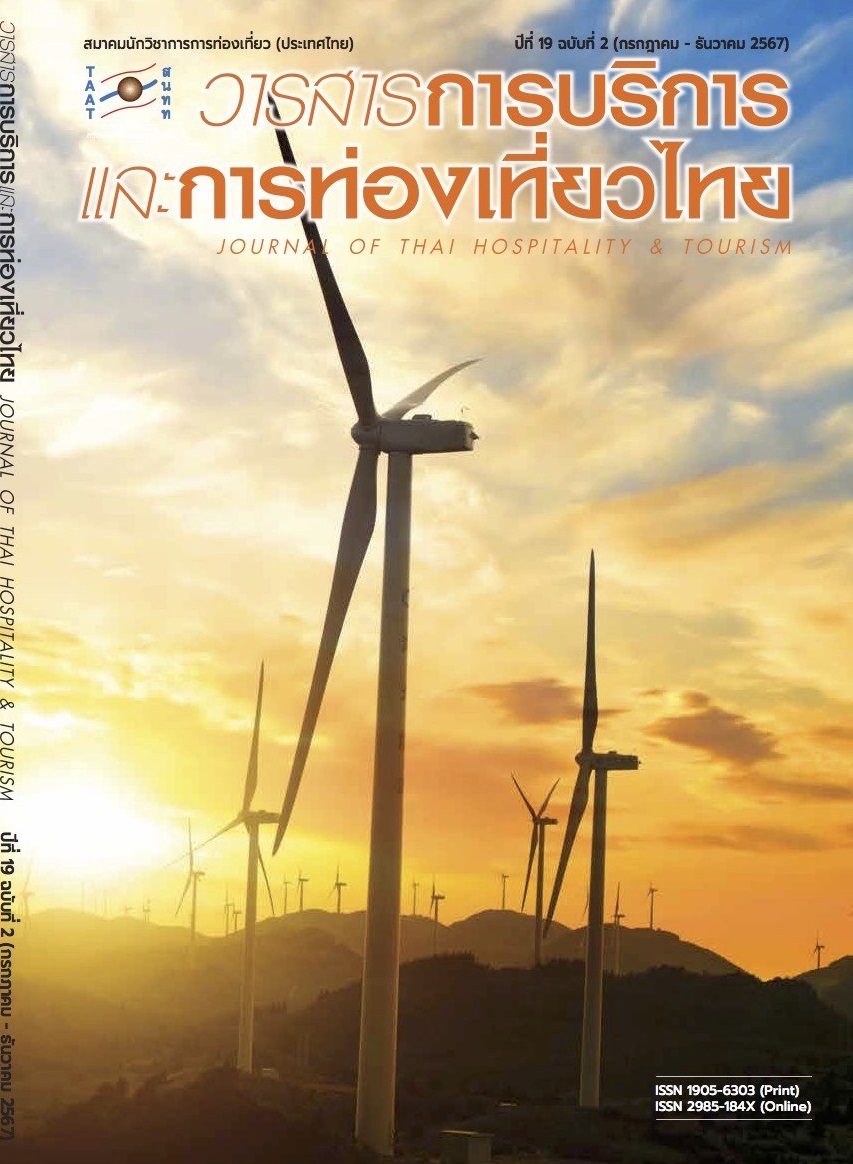แนวทางการพัฒนาการท่องเที่ยวเชิงเกษตร อำเภอวังน้ำเขียว จังหวัดนครราชสีมา
Main Article Content
บทคัดย่อ
การวิจัยนี้มีวัตถุประสงค์เพื่อ 1) ประเมินศักยภาพแหล่งท่องเที่ยวเชิงเกษตร อำเภอวังน้ำเขียว จังหวัดนครราชสีมา และ 2) เสนอแนวทางการพัฒนาศักยภาพการท่องเที่ยวเชิงเกษตร อำเภอวังน้ำเขียว จังหวัดนครราชสีมา ซึ่งเป็นงานวิจัยแบบผสมผสาน โดยประกอบด้วยวิธีวิจัยเชิงปริมาณและวิธีวิจัยเชิงคุณภาพ ประชากรที่ใช้ในการวิจัยครั้งนี้ประกอบด้วยกลุ่มประชาชนในชุมชน จำนวน 15 คน ตัวแทนเจ้าหน้าที่จากหน่วยงานภาครัฐ จำนวน 2 คน และนักท่องเที่ยว จำนวน 330 ตัวอย่าง เครื่องมือที่ใช้ในการวิจัยได้แก่ แบบสัมภาษณ์เชิงลึก และแบบสอบถาม คณะผู้วิจัยได้วิเคราะห์ข้อมูลเชิงพรรณนา สถิติเชิงพรรณนา และวิเคราะห์เนื้อหา
ผลการศึกษาพบว่า 1) ศักยภาพแหล่งท่องเที่ยวเชิงเกษตร อำเภอวังน้ำเขียว จังหวัดนครราชสีมาในภาพรวมอยู่ในระดับมาก และ 2) แนวทางการพัฒนาศักยภาพการท่องเที่ยวเชิงเกษตร อำเภอวังน้ำเขียว จังหวัดนครราชสีมาควรมุ่งพัฒนาใน 4 ประเด็น ประกอบด้วยศักยภาพการบริหารจัดการของแหล่งท่องเที่ยวเชิงเกษตร ศักยภาพการรองรับของแหล่งท่องเที่ยวเชิงเกษตร ศักยภาพการให้บริการของแหล่งท่องเที่ยวเชิงเกษตร และศักยภาพการดึงดูดใจของแหล่งท่องเที่ยวเชิงเกษตร
Article Details

อนุญาตภายใต้เงื่อนไข Creative Commons Attribution-NonCommercial-NoDerivatives 4.0 International License.
เอกสารอ้างอิง
Akpinar, N., Talay, I. & Gun, S. (2005). Priority Setting in Agricultural Land–Use Types for Sustainable Development. Renewable Agriculture and Food Systems, 20(3), 136–147.
Choibamroong, T. (2006). Annual of International Thai Tourism Journal 2006. Thailand Development Research Institute.
Cochran, W. G. (1963). Sampling Techniques. Wiley.
Dash MV. (2022). Agro Tourism “the Choice Farmers to Selling Point of Community. https://www.dashmv.com/agro-tourism
Department of National Parks, Wildlife and Plant Conservation (DNP). (2013). Thap Lan National Park. http://www.park.dnp.go.th/dnp/research/TL1.pdf
Department of Tourism (DOT). (2014). A Handbook of Assessing the Quality Standard of the Agricultural Tourism Destination. http://agrotourism.doae.go.th
Esichaikul, R. & Silparcha, W. (2015). The Potential Development Policy of Agrotourism for ASEAN Tourists. Thailand Research Fund.
Hall, C. M. & Jenkins, J. M. (1998). The Policy Dimensions of Rural Tourism and Recreation. In Tourism and Recreation in Rural Areas. Wiley.
Hron, J. & Srnec, K. (2004). Agrotourism in the Context with the Rural Development. https://eprints.lib.hokudai.ac.jp/dspace/bitstream/2115/34554/1/31-O31.pdf
Malahom, W., Taweekul, K., Palinthorn, F. (2021). Factors Influencing Tourists’ Decision Making on Agro-Tourism in Wang Nam Khiao District, Nakhon Ratchasima Province. Khon Kaen Agriculture Journal, 49(4), 1025–1033.
Ministry of Tourism and Sports (MOTS). (2020). Tourism Statistics 2020. https://mots.go.th/more_news_new.php?cid=592
Nakachat, S. (2012). Guidelines for the Potential Development of the Mushroom Farm to Support Agro-tourism: A Case Study of the Mushroom Farm in Hatyai District, Songkhla Province. Khon Kaen University.
Pongnirundorn, S., Buatham, O. & Yodsuwan, C. (2016). Guidelines for Effective Development in Tourism Management of Wang Nam Khiao District, Nakhon Ratchasima Province. MBA–KKU Journal, 9(1), 234–259.
Thongkhot, Y., Varindaravej, S. & Phuwanna, P. (2020). Guidelines for Creative Agriculture Tourism Activities Development of Ban Huai Somlan, Udonthani Province. Paper Presented in the 7th National Conference Nakhonratchasima College.
Tongla, P. & Samarak, P. (2017). The Management Potential of Chanthaburi Agro-tourism Attractions. Thailand Research Fund.
Tosumphanmongkol, S. (2006). Strategic Planning for Sustainable Ecotourism Development in Tak Province. Srinakharinwirot University.


